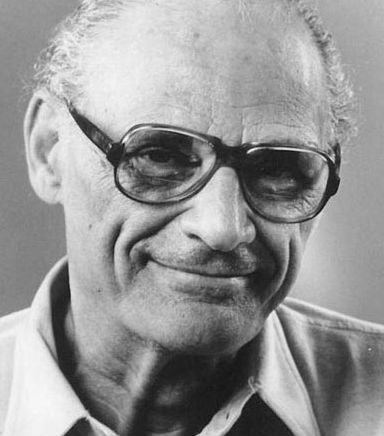How I tracked down Arthur Miller's first play
As the centenary of legendary playwright Arthur Miller arrives, director Sean Turner explains how he got Miller’s long-lost first play onto the stage

This Saturday marks one hundred years since the birth of one of the world’s greatest playwrights and one of my personal heroes. To give you an idea of his ongoing importance to our theatrical landscape, the National Theatre has produced more Arthur Miller plays than any other writer excepting Shakespeare.
Eighteen months ago my interest was piqued by a short passage in Miller’s memoirs, which mentioned a mysterious play No Villain and I became consumed with its discovery. On contacting Miller's long-standing agent and members of the Miller Trust, I was astonished to find that no-one appeared to know of the play. We approached the University of Michigan's superb library facilities and after a few weeks’ research they uncovered a copy of Miller’s original typed manuscript, complete with handwritten notes in pencil. After such a long search for the play I was braced for the disappointment of a substandard student scrawl – but the first scene was enough to persuade me otherwise. It was all there: the natural rhythm, the verve for fixing high poetry into domestic lives, and the ability to draw characters so three-dimensional they seem to live on the page. No Villain is a vital addition to the Miller repertoire and gives us a vivid autobiographical glimpse of his youth. I am indescribably proud to be presenting its world premiere here in London at the Old Red Lion this Christmas.

Born in Harlem, Manhattan in 1915, Miller embodied a sweeping generational change in America that informed the vast majority of his work – plays that include Death of a Salesman, A View from the Bridge and The Crucible. In the late 1920's the Great Depression had taken the exponents of the American Dream by surprise and a fourteen year-old Arthur saw the devastating effects on his own doorstep. The family business crumbled around him taking their Manhattan home and his father's great pride with it. The Millers had been an affluent immigrant family but they lost it all when the stock market crashed in 1929. Throughout Arthur's life he felt guilt for his successes and never took them for granted; he knew just how quickly the rug could be pulled away. In the land of opportunity there must also be great disappointment.
Arthur was the only member of his family to complete university and in 1936 he was discovering a world outside the Jewish garment industry he had been born into. Times were changing and a new wave of Soviet politics was de-rigueur amongst the student body in Ann Arbor, Michigan. He became an outspoken member of the communist movement and, as the son of a factory proprietor, he was
forced to live out the dilemma that would imbue his life’s work; individual duty versus social responsibility. On his return to the new ramshackle house in Brooklyn Heights, where he now shared a bedroom with his grandfather, Miller faced holidays working in the family business. Miller had to decide if his allegiances with the workers (who were now unionised and striking) ran deeper than his
family ties as the boss’s son. This was the crucible in which No Villain, Miller's first play, was fired.
The play explores this quandary in vivid, autobiographical detail, exposing a family in conflict. As the father’s coat business declines and workers strike, a young son returns from university and must decide between his new morals or the family’s wellbeing. The depression is to thank for this play too; his family situation had become so dire that Miller could not afford the fees to return to college the following semester. Serendipitously, the university’s (now illustrious) Avery Hopwood award for Writing offered Miller an opportunity to win $250 and secure his education for the time being. Whilst he harboured dreams of becoming a writer, he had been to the theatre only three or four times and had to ask his college room-mate how long each act should be. Written over 6 days in spring break 1936, the play that emerged is, in Miller's own words "the most autobiographical dramatic work I would ever write". No Villain won the Hopwood Award but – extraordinarily, as the first work of such a towering dramatic figure – was never produced; until now.

Miller's legacy and place in the theatrical canon hinges on four works of literary genius, All My Sons, The Crucible, View From a Bridge and of course Death of a Salesman, but it is held up by numerous supporting plays, novels, short stories, essays, political dissents, human rights campaigns, and of course, a marriage to the most famous film star of all time Marilyn Monroe. When he died in 2005 he left behind a body of work that demonstrates an extraordinary empathy for humanity and an unshakeable conviction in the necessity of social conscience. His peerless exploration of these universal themes mean his reputation as the pre-eminent 20th Century tragedian is untouchable. His plays continue to be revived across the world today as much as ever and they will remain acutely relevant for as long as there is a conflict between power and responsibility.
No Villain runs at Trafalgar Studios until 23 July.












